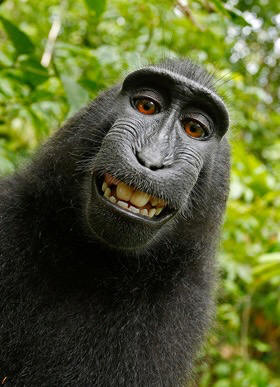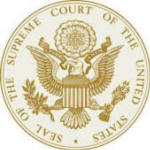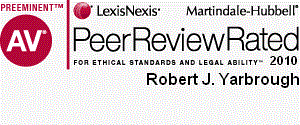Newsletter Issue 66 - August 2014
In this issue:
Non-human copyrights
Amish Mafia
Patent litigation attorney's fees
Ask Dr. Copyright ...
Dear Doc:
What do an elephant, a monkey, and the United States Federal
Government have in common?
Signed,
The Riddler
Dear Riddler:
The answer to your query is: none of them can own copyrights! (Bet
you didn't see that one coming! BIFF! POW! BAM!!)
Under federal copyright law (17 U.S.C. §101 et seq.) works created
by the federal government cannot be protected by copyright law - the
taxpayers paid for it, so we all get the right to use it. For
entirely other reasons, non-human animals cannot be authors, and
there is no copyright for what they create - it's also in the public
domain. Now, I know what you're thinking...if corporations can be
authors under federal law, and can author works in which they own
copyright, what sense does it make to say that highly intelligent,
not to mention cute elephants that paint wonderful watercolors, and
monkeys who are photographers can't be legal authors? Besides, how
do we KNOW that monkeys don't have copyrights?
Well "Rid", in 2011, photographer David Slater had his camera taken
by a very self-aware monkey in Indonesia. The monkey snapped a
"selfie" which later made its way into the web site Wikimedia
Commons. Here's the photo in question:
When Mr. Slater wrote to Wikimedia, demanding that it remove the
photo, their response was, in effect, "monkeys don't have
copyrights, so the photo is in the public domain, and we don't care
that it was your camera." That may sound harsh, but the United
States Copyright Office, in a recently-published proposed guideline
said the same thing:
"The Office will not register works produced by nature, animals, or
plants. Likewise, the Office cannot register a work purportedly
created by divine or supernatural beings, although the Office may
register a work where the application or the deposit copy(ies) state
that the work was inspired by a divine spirit. Examples: A
photograph taken by a monkey. A mural painted by an elephant...."
It turns out that the legal justification for this policy is, "The
copyright law only protects "the fruits of intellectual labor" that
"are founded in the creative powers of the mind." (ZAP!) - So...it
turns out that the reasoning IS the same! When was the last time
that you thought that there was even a shred of "creative powers of
the mind" in the government?
It may yet turn out that animals (at least smart ones like dolphins)
have "creative powers of the mind". That would certainly make a
monkey out of the guys at the Copyright Office.
As Douglas Adams wrote in "A Hitchhiker's Guide to the Galaxy,"
"...on the planet Earth, man had always assumed that he was more
intelligent than dolphins because he had achieved so much-the wheel,
New York, wars and so on-whilst all the dolphins had ever done was
muck about in the water having a good time. But conversely, the
dolphins had always believed that they were far more intelligent
than man-for precisely the same reasons."
So...if you have a talented pet that is especially creative, I
suggest that you do what all great teachers do: take all the credit.
Then call an attorney at LW&H to register copyright, but don't dare
tell them that your Norwegian Blue is the author. After all, the
plumage don't enter into it! (Just kidding!)
The Doc.
Hit Show Upsets Pennsylvanians (and others)!
You may have heard about the Discovery channel's popular TV
series, Amish Mafia. The Discovery Channel describes the show:
"Untrusting of outside law enforcement, some Amish in Lancaster
County, PA have for many years regularly turned to a small organized
group of men for protection and justice. Discovery's new series
Amish Mafia provides a first-ever look at the men who protect and
maintain peace and order within the Amish community in Lancaster."
This has the Amish community quite upset because, they say,
there
has never been a so-called Amish Mafia and that any suggestion that
the Amish would be involved in such an endeavor is disparaging,
insulting and bigoted. Amish culture values pacifism and harmony,
not "violence and retaliation."
According to the Philadelphia Inquirer, there are a number of
Lancaster County activists taking the bull by the horn. Mary
Haverstick has the led the charge by creating the respectAmish.org
web site. Governor Corbett and congressional officials have sent a
letter to the Discovery Channel requesting it to pull the show.
So why are we writing about this? Is there an intellectual property
angle here? Of course. The Inquirer also reports that Brad Igou,
president of the "Amish Experience" has created an "Amish Mafia
Exposed" tour. So, predictably, the
Discovery Channel wrote Mr.
Igou a cease and desist letter, accusing him of trademark
infringement. Well, maybe, but how strong is that allegation? You
may recall that we wrote recently about the Washington Redskins'
troubles at the USPTO. Its trademark registrations were cancelled
by the Trademark Trial and Appeal Board on the basis that they are
disparaging to Native Americans.
We took a look at the trademark filing for AMISH MAFIA as it
pertains to entertainment services and, consistent with the Redskins
case, the USPTO denied the Discovery Channel's application on
grounds that
"AMISH MAFIA as used for the applicant's entertainment services
conveys the idea of a criminal organization composed of members of
the Amish religious sect, and such a meaning is disparaging to a
substantial composite of that religious sect."
Of course, the Discovery Channel has appealed but, in the meantime,
all it has are common law trademark rights governed by Pennsylvania
law. No doubt, under Pennsylvania statutory law, the Discovery
Channel would have the same problems registering AMISH MAFIA in
Pennsylvania as it does on the federal level. Pennsylvania law
prohibits registration of trademarks that disparage a person's
beliefs or bring them in disrepute. Whether Pennsylvania courts
apply this standard to a common law trademark, to the best of our
knowledge, has not been determined. This will be an interesting
story to follow.
Patent Litigation: Collecting Attorney's Fees Just Got Easier! 
Patent infringement litigation usually is high stakes and very
expensive. The cost of the litigation can easily reach seven
figures or more. In the United States, each party to litigation
generally bears its own costs, with exceptions.
Section 285 of the
patent statute contains the exception for patent litigation. The
statute is short and sweet:
"The court in exceptional cases may award reasonable attorney fees to
the prevailing party." (Emphasis supplied).
But what cases are 'exceptional?' In the past, the Federal Circuit
Court of Appeals, which hears patent appeals, only allowed an award
of attorneys fees if the claim or defense was 'objectively baseless'
based on 'clear and convincing evidence.' This standard favored
patent owners seeking to enforce patents and provided a bright-line,
predictable result.
Earlier this year the Supreme Court in Icon Health & Fitness
rejected the Federal Circuit bright-line standard, and, in keeping
with the recent Supreme Court approach to patent cases, adopted a
fuzzy-is-better standard:
"...an "exceptional" case is simply one that stands out from the
others with respect to the substantive strength of a party's
litigating position (considering both the governing law and the
facts of the case) or the unreasonable manner in which the case was
litigated. District courts may determine whether a case is
"exceptional" in the case-by-case exercise of their discretion,
considering the totality of the circumstances..."
The Federal Circuit recently considered the Icon Health & Fitness
case on remand from the Supreme Court and sent the case back to the
lower court for decision on the attorneys fee issues. The Federal
Circuit reminded the lower court that the attorneys fee decision
does not stop with a determination that a case is 'exceptional.'
The lower court has discretion to deny attorneys fees even in
exceptional cases. The decision of the lower court judge will be
reviewed on appeal only to determine whether the judge abused his or
her discretion, which means the Federal Circuit will defer to the
lower court judge in almost all cases.
The effect of the decisions is to transfer power from the Federal
Circuit to the district court judges who hear the witnesses, see the
evidence, and observe the litigation behavior of the parties. The
effects on the parties are to reduce the predictability of patent
litigation, to increase the risk to every patent litigant, and
generally to discourage patent litigation..

